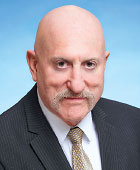APA’s Outgoing President Recalls Year of Accomplishments Despite Unsettled Times
“When I look back on my presidency of the American Psychiatric Association, I will be proud and thankful for all we managed to accomplish, as well as all we will manage to accomplish as we emerge from this pandemic and these unsettled times.”

So said outgoing APA President Jeffrey Geller, M.D., M.P.H., at the Opening Session of APA’s online 2021 Annual Meeting.
It has been a year no one will forget. “We found ourselves in a space where a virus impacted our ways of functioning in our Association, our day-to-day jobs, and our personal lives,” Geller said. “We found ourselves in a place where there were no face-to-face communications whatsoever. Some of our members began taking—for the first time—virtual appointments, and some of our members began having all virtual appointments. This is a dramatic change to the face of psychiatry as we knew it, and how we will operate when we emerge is to be determined.”
Meanwhile, the killing of George Floyd last year in Minneapolis set off a racial reckoning not only for the country but also for APA. “Now, as we meet not face to face, but in this very different way, we can reflect on everything we shared over the past year. I honestly believe that in this dual reckoning, we have emerged stronger as a field.”
Geller hailed the psychiatrists, including trainees and fellows, who served on the front lines during the worst days of the pandemic—especially in New York City in March through May 2020, but in other cities as well. “Those of you who stepped in on the front lines, many of you fellows and residents, deserve the nation’s gratitude for your service and bravery. You did incredible work in impossible circumstances. I will never forget this and remain inspired.”
He cited three landmarks of his presidential year: the creation of the Committee on Climate Change and the appointment of the Task Force to Address Structural Racism Throughout Psychiatry and the Task Force on Assessment of Psychiatric Bed Needs in the United States.
“The Board of Trustees agreed that climate change’s impact on our mental health and our planet needed very much to be at the level of an APA committee. Elevating it shows our commitment as a field to not only helping those who suffer from the mental health impacts of climate change but to eradicating it as a global threat.”
The goal of the Task Force on Assessment of Psychiatric Bed Needs, chaired by former APA President Anita Everett, M.D., was to develop a model to help states and localities determine the on-the-ground capacity to treat people with mental illness.
“What happened over the course of the year was that more than 40 task force members and consultants from inside and outside the field of psychiatry stepped up and volunteered to help,” Geller said. “The task force is making substantial progress toward its final products, including a white paper that assesses psychiatric inpatient beds as well as community services and alternatives that might mitigate the demand for adult and child/adolescent inpatient beds. In addition to the white paper, the modeling subgroup is developing two models to reflect the complexities of the adult and child/adolescent systems.”
He also hailed the work of the Presidential Task Force to Address Structural Racism Throughout Psychiatry, chaired by Cheryl Wills, M.D.
“Over the course of 10 months, this extraordinary group of individuals set out to examine anti-Black racism as it manifested itself in our very core,” he said. “The task force formed work groups who studied our operations and presented substantial changes that we could put into effect to encourage equity and inclusion. It examined the scientific program of this meeting to ensure that sessions and speakers addressing diversity, inclusion, and equity were well represented. And with an eye to the future, it brought in our resident and fellow members on many projects that will help ensure the pipeline to leadership is a diverse one.”
Perhaps the most public part of the work was the Board’s decision to issue APA’s “Apology to Black, Indigenous, and People of Color for Its Support of Structural Racism in Psychiatry.”
Meanwhile, the work of APA’s advocacy continued despite the pandemic. “We were able to defeat legislation that would have redefined psychologists as physicians under Medicare and legislation that would have broadened the scope of practice to let people without medical degrees prescribe psychiatric medications,” he said. “We advocated for more lenient telehealth rules, which in this extremely challenging time allowed more patients stuck in their homes to access lifesaving care.”
Going forward, Geller said he hopes to see the elimination of the Medicaid Institutions for Mental Disease exclusion rule. “This discriminatory rule prohibits Medicaid payments to hospitals for treating adult patients with more than 16 beds,” he said. “It is limiting our capacity to treat those with psychiatric disorders and causing harm to those who need it most.”
Geller concluded: “As we faced tremendous unforeseen obstacles together, we sometimes spoke strongly or confronted one another with uncomfortable facts. But we grew together as a field. As psychiatrists and physicians, we know that when we are in crisis and when we face reckonings, surfacing the wounds can give us power to heal. I hope this is what we began to do this year and will continue to do in the next.” ■



